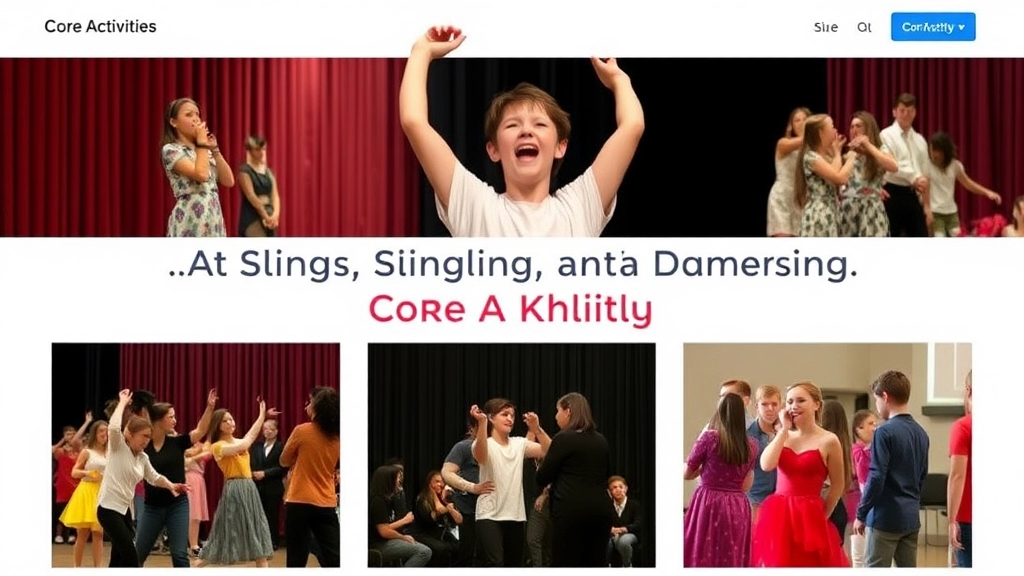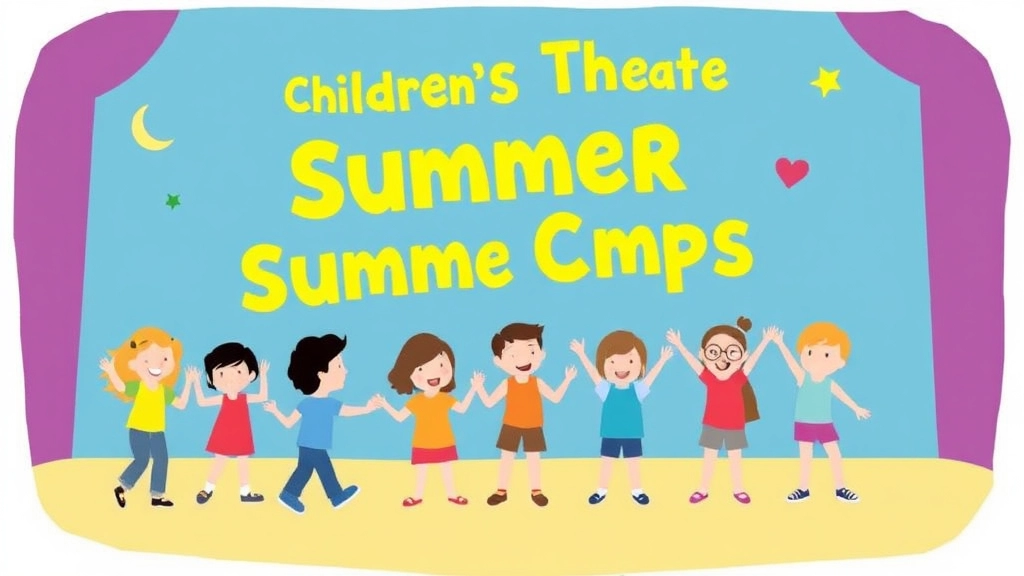Children’s Theater Summer Camps
If you’re looking for an exciting and educational way to keep your kids engaged this summer, look no further than Children’s Theater Summer Camps. These camps offer a variety of programs tailored to different age groups, ensuring that every child finds a perfect fit. From acting and singing to dancing, children can immerse themselves in the performing arts while building confidence and creativity.
Standout Features
One of the standout features of these camps is the opportunity for performance showcases. Parents can expect to see their children shine on stage, demonstrating the skills they’ve developed throughout the camp. Additionally, many camps offer flexible scheduling and extended care options, making it easier for busy families to participate.
Financial Assistance
Scholarships and financial assistance are often available, ensuring that every child has the chance to experience the magic of theater.
Variety of Camps for Different Age Groups
Are you worried about finding the right summer camp for your child? Wondering if there’s a camp that suits their age and interests? You’re not alone. Many parents face this dilemma each year, and it’s crucial to make the right choice to ensure a rewarding experience for your child.
Age-Specific Camps: Tailored Experiences
When it comes to summer camps, one size does not fit all. The variety of camps available cater to different age groups, ensuring that each child gets the most out of their experience. From toddlers to teenagers, there’s something for everyone.
- Early Childhood Camps (Ages 4-6): These camps focus on introducing young children to the world of performing arts in a fun and engaging way. Activities are designed to be short, interactive, and playful, keeping the little ones entertained while sparking their creativity.
- Primary School Camps (Ages 7-11): For this age group, camps offer a more structured approach. Children get a chance to delve deeper into specific activities like acting, singing, and dancing. They work on simple performances, building their skills and confidence.
- Teen Camps (Ages 12-16): Teenagers often crave more challenging and immersive experiences. Camps for this age group focus on advanced techniques and performance skills. Teens may work on full-scale productions, honing their craft and preparing for more serious pursuits in the arts.
Why Age Matters
Choosing the right camp based on age is vital. It ensures that the activities are developmentally appropriate and that your child is surrounded by peers at a similar stage. This not only makes the experience more enjoyable but also more impactful.
Real Concerns, Real Solutions
Many parents worry about whether their child will fit in or if the camp will be too challenging or not challenging enough. Here’s how to address these concerns:
- Talk to Camp Directors: They can provide detailed information about the camp’s structure and how it caters to different age groups.
- Visit the Camp: If possible, take a tour. Seeing the environment can give you a better sense of whether it’s the right fit for your child.
- Read Reviews: Other parents’ experiences can offer valuable insights. Look for feedback from parents of children in the same age group as yours.
Personal Story: Finding the Perfect Fit
I remember when I first sent my daughter to a summer camp. She was seven, and I was worried she might feel overwhelmed. But the camp was fantastic. It was specifically designed for her age group, with activities that kept her engaged and excited. By the end of the summer, she had made new friends and discovered a passion for singing. That experience was a game-changer for her confidence and creativity.
Making the Right Choice
Selecting a camp that caters to your child’s age group is crucial for a positive and enriching experience. It’s about finding that perfect balance where your child feels both challenged and comfortable. The right camp can ignite a lifelong passion and build invaluable skills.
So, when you’re on the hunt for the perfect camp, keep age-specific options at the forefront of your decision-making process. It’s the first step towards a summer full of growth, fun, and new adventures.
For more tips on selecting the best camp, you might find our essential guide to becoming a summer day camp counselor helpful.
Acting, Singing, and Dancing: Core Activities

Ever wondered if your kid’s got what it takes to be the next big star?
Acting, Singing, and Dancing are the core activities that can turn that dream into reality.
The Triple Threat
Let’s break it down.
Acting: It’s not just about memorising lines. It’s about expressing emotions, understanding characters, and building empathy. Your child will learn to step into someone else’s shoes and tell compelling stories.
Singing: Whether your kid’s a shower singer or a budding pop star, singing is a powerful tool. It teaches breath control, pitch, and rhythm. Plus, it’s a fantastic way to boost confidence.
Dancing: Movement is magic. Through dancing, children learn coordination, rhythm, and how to express themselves without words. It’s also a great way to stay fit and healthy.
Why These Activities Matter
These core activities aren’t just about performing. They’re about building skills that last a lifetime.
- Confidence: Standing on stage takes guts. Performing in front of others helps kids overcome shyness and build self-esteem.
- Creativity: Acting, singing, and dancing foster imagination and creativity. Kids learn to think outside the box.
- Teamwork: Many performances are group efforts. Kids learn to work together, support each other, and create something amazing as a team.
Real Stories, Real Impact
I remember one kid, let’s call him Jack.
Jack was shy, barely spoke in class. But once he got on stage, something clicked.
By the end of the camp, he was leading roles, singing solos, and dancing like no one was watching.
His parents couldn’t believe the transformation.
How to Get Started
Thinking of enrolling your child in a performing arts camp?
Here’s what you need to consider:
- Check the curriculum: Make sure the camp offers a balanced mix of acting, singing, and dancing.
- Look for experienced instructors: The right teachers can make all the difference.
- Consider your child’s interests: Does your child love belting out tunes or busting a move? Tailor the camp experience to their passions.
Performance Showcases for Parents
Ever wondered if your child’s summer camp experience could culminate in something truly memorable? Picture this: your child, brimming with confidence, performing on stage in front of an audience of proud parents. Performance showcases for parents are a core feature of many performing arts camps, and they offer a host of benefits that go beyond the final applause.
Why Performance Showcases Matter
Let’s address the real questions and worries you might have. How can you be sure your child is getting the most out of their camp experience? Is there a tangible way to measure their growth in acting, singing, and dancing? Performance showcases are the answer. They provide a platform for children to demonstrate what they’ve learned, offering parents a front-row seat to their progress.
Key Benefits of Performance Showcases:
- Confidence Building: Performing in front of an audience can significantly boost a child’s self-esteem. It’s a chance for them to shine and receive positive reinforcement.
- Skill Application: Showcases allow children to apply what they’ve learned in a real-world setting, reinforcing their skills in acting, singing, and dancing.
- Parental Insight: As a parent, you get to see firsthand the value of the camp. It’s a transparent way to observe your child’s development and the quality of the instruction they’re receiving.
- Memorable Experience: These events create lasting memories for both children and parents. It’s a shared experience that can strengthen family bonds.
The Structure of a Performance Showcase
Typically, a performance showcase will include a variety of acts, allowing each child to participate in a way that highlights their strengths. Here’s a breakdown of what you might expect:
- Opening Number: A group performance that sets the tone and gets everyone excited.
- Individual Performances: Each child has a moment to shine, whether it’s a monologue, solo song, or dance routine.
- Group Acts: Collaborative performances that teach teamwork and coordination.
- Closing Number: A grand finale that brings everyone together and leaves a lasting impression.
Real Stories, Real Impact
Take Sarah, for example. She was a shy 10-year-old who hardly spoke up in class. After attending a performing arts camp, she found her voice. During the final showcase, she performed a solo that left everyone in awe, including her parents who never imagined she had such talent. This experience didn’t just boost her confidence; it transformed her outlook on what she could achieve.
Tips for Parents
If you’re considering a camp with performance showcases, here are a few tips to ensure it’s the right fit:
- Research the Camp’s Track Record: Look for testimonials and reviews from other parents.
- Visit a Showcase: If possible, attend a showcase from a previous session to gauge the quality and atmosphere.
- Talk to the Instructors: Understand their approach and how they prepare children for the performance.
Performance showcases for parents are more than just an end-of-camp activity. They are a vital part of the learning experience, offering tangible benefits for children and invaluable insights for parents. For more information on finding the perfect summer camp, check out our guide on the top summer camps for 14-year-olds and explore the PWC summer camps for a variety of programs and activities.
Building Confidence and Creativity

Ever worried your kid might be too shy to shine? Or maybe they’ve got the creativity but lack the confidence to show it off?
Yeah, I get it. It’s a common concern for many parents.
Confidence and Creativity: The Dynamic Duo
At performing arts camps, kids don’t just learn lines or dance steps. They build confidence and creativity.
How?
- Safe Environment: Kids get a safe space to try new things without fear of judgment.
- Supportive Peers: They’re surrounded by like-minded peers who cheer them on.
- Expert Guidance: Professional instructors guide them every step of the way.
Real Stories, Real Growth
I’ve seen kids transform from wallflowers to stage stars.
Take Jamie, for example. He was so shy he wouldn’t even raise his hand in class. After a few weeks at camp, he was leading group performances and even choreographing his own dance routines.
Why It Works
- Small Wins: Every little success, like nailing a dance move or delivering a line perfectly, builds their confidence.
- Creative Expression: Kids get the freedom to express themselves, whether through acting, singing, or dancing.
- Teamwork: Working on group projects teaches them to trust others and themselves.
Quick Tips for Parents
- Encourage Participation: Let them know it’s okay to make mistakes.
- Celebrate Efforts: Focus on their effort, not just the outcome.
- Be Supportive: Show up for their performances and cheer them on.
So, if you’re looking to boost your child’s confidence and creativity, a performing arts camp might just be the ticket.
Trust me, it’s a game-changer.
Selecting the Right Camp for Your Child
Are you feeling overwhelmed by the myriad of camp options available for your child? Choosing the right camp can feel like navigating a maze, but it doesn’t have to be that way. Let’s break it down into manageable steps to ensure you find the perfect fit for your child’s needs and interests.
Understand Your Child’s Interests and Needs
Firstly, consider your child’s passions and personality. Are they more inclined towards acting, singing, or dancing? Or perhaps they enjoy a mix of all three? Understanding their preferences will help narrow down your choices.
- Interest in Activities: Identify whether your child is more enthusiastic about acting, singing, dancing, or a combination. This will guide you towards camps that focus on their favourite activities.
- Skill Level: Assess their current skill level. Some camps cater to beginners, while others are designed for more advanced participants.
- Social Needs: Consider whether your child thrives in large groups or prefers smaller, more intimate settings.
Research and Compare Camps
Once you have a clear understanding of your child’s needs, start researching camps. Look for reviews and testimonials from other parents and children. Pay attention to the camp’s reputation, the qualifications of the instructors, and the camp’s overall philosophy.
- Reputation and Reviews: Check online reviews and ask for recommendations from other parents.
- Instructor Qualifications: Ensure that the instructors are experienced and qualified in their respective fields.
- Camp Philosophy: Understand the camp’s approach to teaching and nurturing young talent.
Visit the Camps
If possible, visit the camps you’re considering. This allows you and your child to get a feel for the environment and see if it’s a good fit.
- Camp Environment: Observe the facilities and ensure they are safe and well-maintained.
- Interaction with Staff: Speak with the staff to gauge their enthusiasm and dedication.
- Current Campers: If possible, talk to current campers to get their honest feedback.
Consider Practical Aspects
While your child’s interests are paramount, practical considerations are also important.
- Location: Choose a camp that is conveniently located to avoid long commutes.
- Schedule: Ensure the camp schedule aligns with your family’s routine.
- Cost: Evaluate the camp fees and see if they fit within your budget. Don’t forget to inquire about scholarships and financial assistance if needed.
Trust Your Instincts
Finally, trust your instincts. You know your child best, and if something doesn’t feel right, it probably isn’t. On the other hand, if a camp feels like a perfect fit, it likely is.
For instance, if your child is interested in a mix of activities including adventure and STEM, you might want to explore the options available at Boulder Summer Camps. Alternatively, if your child is more inclined towards arts and outdoor fun, Thanksgiving Point Summer Camps could be a great fit.
Scholarships and Financial Assistance

Worried about the cost of sending your child to camp?
I get it.
Camps can be pricey, and not everyone has a stash of cash lying around. But here’s the good news: there are scholarships and financial assistance options available.
Why should your child miss out on an amazing experience just because of money?
Here’s how you can make it happen:
1. Look for Camp-Specific Scholarships
Many camps offer their own scholarships. These can be partial or full scholarships, depending on the camp’s resources and your financial situation.
2. Check with Local Organisations
Sometimes, local businesses, community centres, or even schools have funds set aside for activities like camps. It’s worth asking around.
3. Apply Early
Funds are usually limited. The earlier you apply, the better your chances of securing financial aid.
4. Be Honest and Thorough
When filling out applications, be honest about your financial situation. Provide all the required documents to avoid delays.
5. Consider Payment Plans
Some camps offer payment plans to make the cost more manageable. Instead of paying a lump sum, you can spread the payments over a few months.
6. Look for Discounts
Early bird discounts, sibling discounts, and referral discounts can also help reduce the cost.
Real Talk:
I once knew a mum who was stressed out about the cost of a summer camp for her twins. She almost gave up until she found a local charity that offered to cover half the fees. The kids had the time of their lives, and she didn’t break the bank.
Final Thought:
Don’t let money be the barrier between your child and a fantastic camp experience. Explore all your options—scholarships, financial aid, payment plans, and discounts. It’s worth the effort.
Extended Care and Flexible Scheduling
Worried about fitting camp into your busy schedule?
You’re not alone.
Parents everywhere are juggling work, errands, and a million other things.
Why Extended Care Matters
Extended care is a game-changer.
Here’s why:
- Early drop-off and late pick-up: No more rushing to pick up your kid.
- Extra activities: Keeps kids engaged longer.
- Peace of mind: Know they’re safe and having fun.
Flexible Scheduling: A Lifesaver
Flexibility is key.
Not every family can commit to a full week or specific hours.
Here’s how flexible scheduling helps:
- Part-time options: Choose days that work for you.
- Custom hours: Fit camp around your life, not the other way around.
- Last-minute changes: Adjust as needed without stress.
Real Stories, Real Solutions
I remember chatting with Emma, a single mum.
She works two jobs and was worried about camp pick-up times.
Extended care was her lifesaver.
Emma could drop off her son early and pick him up after work.
No stress, no hassle.
How to Choose the Right Camp
Look for these features:
- Extended care options: Early drop-off and late pick-up.
- Flexible scheduling: Part-time and custom hours.
- Transparent policies: Know the rules for changes and cancellations.
Extended care and flexible scheduling aren’t just perks.
They’re essentials.
They make camp accessible for every family.
So, when you’re picking a camp, keep these in mind.
Your schedule will thank you.
And so will your kid.
For more information on camps that offer these features, check out our top summer camps in Northern Virginia for 2024 and Apex Summer Camp.
FAQs about Children's Theater Summer Camps
What are the core activities at children’s theater summer camps?
Children’s theater summer camps focus on three core activities: acting, singing, and dancing. These activities help children express emotions, understand characters, build empathy, learn breath control, pitch, rhythm, coordination, and fitness.
Why are acting, singing, and dancing important for kids?
These activities are crucial because they help in building confidence, creativity, and teamwork. Performing on stage helps kids overcome shyness, fosters imagination, and teaches them to work together to create something amazing.
How do these camps help in building confidence and creativity?
Children’s theater camps provide a safe environment for kids to try new things, surrounded by supportive peers and guided by professional instructors. This helps them build confidence and express their creativity.
Can you share any success stories?
Absolutely! For example, a shy kid named Jack transformed into a leading performer by the end of the camp, taking on lead roles, singing solos, and dancing confidently. Another child, Jamie, went from being too shy to raise his hand in class to leading group performances and choreographing dance routines.
What should I consider when enrolling my child in a performing arts camp?
Here are some key points to consider:
- Check the curriculum: Ensure the camp offers a balanced mix of acting, singing, and dancing.
- Look for experienced instructors: The right teachers can make a significant difference.
- Consider your child’s interests: Tailor the camp experience to what your child loves.
Are there any scholarships or financial assistance available?
Yes, many camps offer scholarships and financial assistance. Here are some options:
- Camp-specific scholarships: These can be partial or full scholarships.
- Local organizations: Community centers, local businesses, or schools may have funds available.
- Apply early: Funds are limited, so early application increases your chances.
- Be honest and thorough: Provide accurate financial information and required documents.
- Payment plans: Some camps offer payment plans to make costs more manageable.
- Discounts: Look for early bird, sibling, and referral discounts.
What tips can parents follow to support their kids in these camps?
Here are some quick tips:
- Encourage participation: Let them know it’s okay to make mistakes.
- Celebrate efforts: Focus on their effort, not just the outcome.
- Be supportive: Attend their performances and cheer them on.
How can I make the camp experience affordable for my child?
Don’t let money be a barrier. Explore scholarships, financial aid, payment plans, and discounts. Many parents have successfully found ways to afford camps through these options.
References
-
Performing Arts Camps for Kids: Benefits and Options
-
How Performing Arts Benefit Kids’ Confidence and Creativity
-
Scholarships for Summer Camps: How to Find Financial Aid

